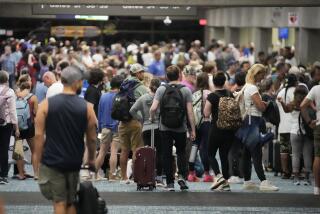South Asia: Know before you go
Whether to travel as a tourist to southern Asia after the Dec. 26 tsunami disaster is a choice born of both feeling and facts.
An important fact is that most of the region escaped harm from the earthquake and huge wave that killed more than 150,000 in a dozen nations. Damage was intense but localized.
“Most people perceive a natural disaster as extending much farther than it does,” said Edward Hasbrouck, author of “The Practical Nomad” books who works with Airtreks.com, a San Francisco-based travel agency. “You should do some research before you cancel a trip.”
Still, he added, “I don’t think many people are going to enjoy vacations in many of the worst-hit areas . You’re going to be in a community that’s grieving.” Instead, he suggested, consider donating what you would have spent on a vacation to relief efforts.
Noting that tourism accounts for nearly one-third of the economies of some destinations, Kathryn Sudeikis, president of the American Society of Travel Agents, said, “I’m really in favor of continuing to travel to bring these places back,” although she would avoid “the most devastated areas.”
Ambassadors from Thailand, Indonesia and Sri Lanka met in Warsaw last week to appeal for tourists to return.
It can be tough to get good information. Tourist bureaus, for instance, may emphasize how many hotels remain open in hard-hit areas. And yet, “there may be very real health risks, even if the hotel you’re staying in is not affected,” Hasbrouck said, citing water pollution and other infrastructure damage. The websites of the Centers for Disease Control and Prevention, https://www.cdc.gov , and the World Health Organization, https://www.who.int , have posted updates on health issues in tsunami-affected areas. Your travel agent should be a good source too. For discussion from travelers, try online chat rooms, such as the Thorn Tree on https://www.lonely planet.com.
Here are updates on the region’s situation and the airline, cruise and tour industries. All information, gathered from governments, agencies and tourist bureaus, was current, except where noted, as of the Travel section’s deadline Tuesday.
India
Situation: More than 10,000 killed. Extensive damage on the eastern coast of southern India in the states of Tamil Nadu, Pondicherry, Andhra Pradesh and Kerala, and Andaman and Nicobar islands. State Department: No warnings.
Resource: https://www.incredibleindia.org . (Click on “Tsunami Update.”)
Indonesia
Situation: More than 100,000 killed. The island of Sumatra, especially Aceh province, was heavily damaged, with disruption of sanitation and health systems. The resort island of Bali was unaffected. State Department: At the time of the tsunami, Indonesia was under a travel warning (urging Americans to defer nonessential travel) because of terrorist concerns.
Resources: https://www.budpar.go.id (Ministry of Culture and Tourism, and Indonesia Culture and Tourism Board) and https://www.thejakartapost.com (largest English-language newspaper in Indonesia).
Malaysia
Situation: At least 68 killed. Damage in northwestern states and on some islands. Most of the Malaysian peninsula is unaffected. State Department: Before the tsunami, it had advised caution while visiting the east coast of Sabah state because of kidnapping incidents.
Resource: https://www.tourism.gov.my/tsunami .
Maldives
Situation: More than 80 killed and thousands more homeless. Sixty-three of the republic’s 87 resorts were open, and 20 were closed by tsunami damage; four had been under construction before the tragedy. State Department: Americans urged to avoid.
Resource: https://www.maldivestourism.gov.mv /index.asp.
Sri Lanka
Situation: More than 30,000 killed. As of Jan. 7, 187 of the island’s 243 hotels were open and 56 were closed. Two key hotels, the Galle Face in Colombo and Mt. Lavinia, just south of the capital, were undamaged. State Department: Americans urged to avoid travel.
Resource: https://www.contactsrilanka.org
Thailand
Situation: More than 5,000 killed. Damage confined to certain areas of the southern provinces on the Andaman Sea, including the resort island of Phuket, where about 10% of the hotel rooms were affected. Bangkok and other tourist destinations were unaffected. State Department: Americans urged to avoid travel to the southwestern region, including Phuket, Phi Phi Island, Krabi and small islands in the vicinity.
Resources: https://www.tourismthailand.org ; https://www.phuket.com .
Airlines
Many carriers loosened restrictions on rebooking and waived change fees for travelers headed to southern Asia. Check with your airline. Here are some general policies: Northwest: Policy changes affect passengers who bought tickets on or before Dec. 26 for travel on or before March 31 to Bangladesh, several states in India, Indonesia, Malaysia, Myanmar, Sri Lanka, Singapore or Thailand. Unused tickets can be rebooked for up to a year without a change fee, but any fare difference will be charged.
Continental: Customers ticketed for travel Dec. 26 to Jan. 31 through affected southern Asian nations may reschedule or reroute without penalty.
Singapore: “Administrative charges” will be waived for certain rebookings.
Cruises
Among reroutings in the region: Seabourn’s Seabourn Spirit canceled its Tuesday visit to Phuket and instead will call on Penang, Malaysia. It was expected to return March 1 to Phuket. An April 16 call on Colombo, Sri Lanka, was canceled.
Cunard’s Queen Elizabeth 2 will omit a scheduled Feb. 21 call on Padang Bay, Bali, and instead spend the day at sea.
Star Cruises canceled several Phuket calls by its SuperStar Virgo and SuperStar Gemini ships, which regularly call there.
Tours
“We haven’t had any mass cancellations to South Asia,” said Laudie Hanou, vice president of the tours division of Encino-based SITA World Travel Inc. “People are adjusting itineraries or moving the dates by a few weeks.”Hanou’s 72-year-old company designs customized travel for individuals and groups to India, Indonesia, Vietnam and other destinations.
Other tour operators were making special arrangements. Although cancellations had been minimal, Gate 1 Travel, based in Glenside, Pa., said it would waive amendment fees for customers who wished to bypass Phuket on some upcoming tours.
Be sure to check your travel insurance policy, if you have one; it may cover this situation.
— Jane Engle
More to Read
Sign up for Essential California
The most important California stories and recommendations in your inbox every morning.
You may occasionally receive promotional content from the Los Angeles Times.










